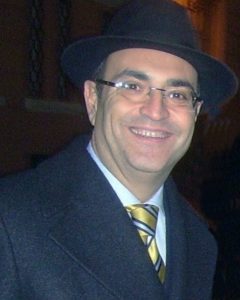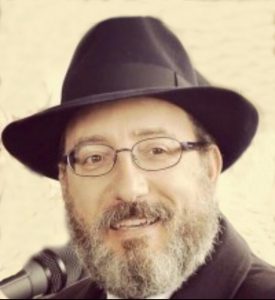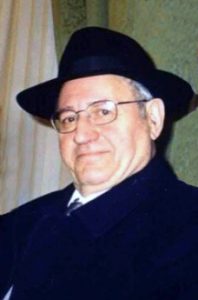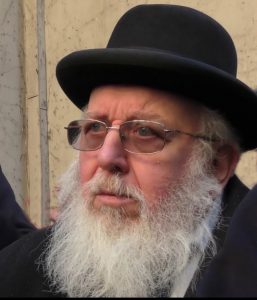Rav Giuseppe Laras z.tz.l.
Rav Giuseppe Laras, יוסף בן שמואל לאראס, was born in Turin on 4/6/1935.
Son of the Shoah, he studied at the Italian Rabbinical College of Turin, where he obtained the title of Maskìl in January 1956 under the guidance of Rav Dario Disegni z.l. Subsequently he received the Semikhà with the title of Chakhàm at the Italian Rabbinical College of Rome in 1959. He also studied with Rav Yechiel Ya’aqòv Weinberg z.l. (Seridé Esh) and with Rabbis Rav Léon Ashkenazi (Manitou) and Rav Yosef Kappah z.l. (the great Yemeni rabbinic authority), with whom he maintained ties of collaboration and friendship. He was Chief Rabbi of Ancona from 1959 to 1968; of Livorno from 1968 to 1980; of Milan from 1980 to 2005; and, again, of Ancona from 2011 to 2017.
He was Director of the Italian Rabbinical College from 1992 to 1999 and, for several decades, until 2009, President of the Assembly of Italian Rabbis (ARI).
He was President of the Rabbinical Court of Milan from 1980 to 2008, as well as, until his death in 2017, of the Rabbinical Court of Central-Northern Italy, which he wanted and founded in 2003.
Author of numerous works, he was the greatest Italian rabbinical authority after the Second World War, and one of the most distinguished Italian intellectuals. Among his main writings we remember:
Mosé Maimonide. Il pensiero filosofico, Morcelliana, Brescia 1998
Storia del pensiero ebraico nell’età antica, Giuntina, Firenze 2006
Meglio in due che da soli. L’amore nel pensiero di Israele, Garzanti, Milano 2009
La Mistica Ebraica, Jaca Book, Milano 2012
Ricordati dei Giorni del Mondo. Storia del pensiero ebraico dalle origini all’età moderna, I tomo, EDB, 2014
Ricordati dei Giorni del Mondo. Storia del pensiero ebraico dall’Illuminismo all’Età Contemporanea, II tomo, EDB, 2014
Natura e pensiero ebraico, Jaca Book, Milano 2015
David Elia Sciunnach
Rav David Elia Sciunnach, di Vittorio Emanuele, דוד אליה בן חיים יגאל עמנואל שונאק, was born in Rome on 11/10/1971.
Since his youth he has studied with Rav Elio Toaff z.l., Rav Yehudah Nello Pavoncello z.l., Rav Aldo Eldad Sonnino z.l., as well as with Michael Tagliacozzo z.l.
In Israel he served in the Israeli Defense Army, coming into contact with some qabbalistic cenacles, including those led by Rav Daniel Stawsky ha-Cohen shlita and Rav Mordechai Sheimbergher shlita (son-in-law of Rabbi Ashlag). He also studied with Rabbi Elon Tedar shlita, Rosh Yeshivat Shemen Sasson.
At Beth ha-Midràsh ha-Sefardì he obtained the diplomas of shochet and menaker. Finally, in 2000, the rabbi and decision-maker Ya’aqòv Peretz shlita conferred on him the semikhà (Yoré Yoré), countersigned by the Chief Rabbi Sephardic of Israel Rav Mordechai Elihahu z.l.
In September 2000, he was called to Milan as an assistant by the then Chief Rabbi and President of the Italian Rabbinical Assembly, Rav Giuseppe Laras z.l., working closely with him also in the Rabbinical Tribunal.
Since 2005 he has been assistant to the Chief Rabbi of Milan, Rav Alfonso Pedazur Arbib shlita. In 2012 he was appointed Rabbi-Chief of Parma, and in 2018, Rabbi-Chief of Ancona and Marche.
Rav Giuseppe Laras z.l., in agreement with Rabbis Elihahu Abargel (formerly Rosh Avòth Batthé ha-Din of Jerusalem) shlita and Zalman Nechemiah Goldberg shlita (distinguished contemporary decision-maker), appointed him his successor (on 10 Av 5777) as Av Beth Din of the Rabbinical Court of Central and Northern Italy.
Among his main writings we point out:
Toràt Immécha -commento alle Parashòth-, vol I, con Nadia Sara Cohen, Milano, 2012
Toràt Immécha -commento alle Parashòth-, vol II, con Nadia Sara Cohen, Milano, 2014
Haggadah di Pesach con commenti dei Maestri italiani, Yalkùt Romi, Milano, 2008;
Responsa Vayven Davìd, Salomone Belforte & C., Livorno, 2017
Elia Enrico Richetti
Rav Elia Enrico Richetti was born in Milano on June 6th, 1950. After obtaining the Classical Maturity at the Schools of the Jewish Community of Milan, he enrolled in the Faculty of Foreign Languages and Literatures at the University of Milan (never completed) and, working as a cult official at the Central Synagogue in Milan and an official of the Rabbinical Office, he prepared in two years, privately, the fourth year examination of the Italian Rabbinical College (Rome), and surpassed it with an average of 9.5 / 10.
In 1974, after having married Enrica Orvieto, she moved with her to Jerusalem, where she studied for two years at the “Beth Midrash la-Torà” (a Talmudic academy of the World Zionist Organization) and another two years at the School Rabbinica “Midrashà Ghevohà la-Torà” of the Harry Fischèl Foundation, directed by Rabbi Shear-Yashuv Cohen, obtaining a rabbinical degree and specialization as a scribe in 1978. In those years he acted as an official of worship at the Italian Rite of Jerusalem Synagogue , where in 1978 his first child was born, currently with his own family.
After moving to Haifa, after several months as an overseer for Jewish food regulations in some factories, he became Rabbi of the Rambam Hospital and Rabbi of the Carmel Hospital Synagogue. In the meantime he specialized as Rabbi circumciser.
In September 1979 he moved to Trieste, where he had been called as Chief Rabbi and where he remained for ten years, during which his daughter was born, currently a teacher of Jewish subjects. In 1980 he was co-opted in the Council of the Assembly of the Rabbis of Italy, as Secretary and Treasurer of the Assembly itself, a position he held for twenty-seven years. Since 2010 he has been President of the Assembly itself. From 1983 to 1991 he was also elected a member of the Italian Rabbinical Council and of the Council of the Union of Jewish Communities of Italy.
From 1989 to 2001 he was Deputy Chief Rabbi of Milan, member, secretary and scribe of the Rabbinical Court of Milan, professor of the Rabbinical College of Milan, teacher of Jewish subjects at the Schools of the Jewish Community of Milan, responsible for the Milan Rabbinical Office surveillance for Jewish food rules in shops and banquets, owner of the funeral office of the Jewish Community of Milan, in charge of the Milan Central Synagogue.
From 2001 to 2010 he was Chief Rabbi of Venice. He nevertheless held the position of member of the Rabbinical Court of Milan until 2005; from 2004 to today he is a member and scribe of the Rabbinical Court of Central-Northern Italy.
He has published articles in various Hebrew and non-Jewish Italian newspapers and periodicals; he is the author of an essay on “Le Mitzwòt al femminile” (1993), as well as some short studies on “The Monthly Review of Israel”. He has edited and edited the edition of Jewish liturgical forms, and is currently printing an annotated translation of the “Sanhedrìn” of the Mishnah.
A passionate cantor of Jewish liturgy, he is an expert in the rites of various Jewish communities in Italy, some of which are recording and preserving the songs.
He is currently Rabbi of the Via Eupili Synagogue in Milan, and collaborates with publishers who deal with Jewish publishing.
Rav Alberto Sermoneta 
Rav Alberto Sermoneta (Rome, 1961) graduated from the Italian Rabbinical College, under the guidance of Rav Elio Toaff z.l., with a rabbinical degree.
He has taught at the Jewish School of Rome and at the Rabbinical College.
He has been a member of the Rabbinical Tribunal of Rome (presided over by Rav E. Toaff z.l.), of the Rabbinical Tribunal and of Milan (presided over by Rav G. Laras z.l.), as well as, later, of the Rabbinical Tribunal of Central and Northern Italy, where he is a judge.
For many years he was advisor to the Italian Rabbinical Assembly and vice-president of the latter for two terms. Since 1997 he has been rabbino-head of the Jewish Community of Bologna. He teaches at the Primo Levi University and other institutes.
Rav Adolfo Aharon Locci

Rav Adolfo Aharon Locci (Rome, 1967), obtained his maskìl diploma and then received his semikhà, with the title of chachàm, at the Italian Rabbinical College in Rome. He also obtained a certificate of studies (Niddà and Issùr ve-Hetter) at the Kolèl of Yeshìvat ha-Kòtel in Jerusalem.
Since 1994 he has been a member of the ARI. Between 1987 and 1998, he served at the Jewish Community of Rome in various roles.
Since 1999 he has been Rabbino-Capo of Padua and, since 2007, reference rabbi of the Jewish Community of Mantua.
Since 2007 he has also been a member of the Board of Directors of the ARI. Over the years he has held other executive and representative positions at the Union of Italian Jewish Communities.
He is a member of the Rabbinical Tribunal of Central and Northern Italy as a dayàn (judge).
He has collaborated with the World Zionist Organization, a body belonging to the Israeli Ministry of Culture, for the organization of various cultural events in Italy.
He has published articles and essays of a historical, biblical and ritualistic nature, as well as two CDs (the second will be released shortly) of Jewish liturgical songs with orchestra accompaniment.
Vittorio Robiati Bendaud





